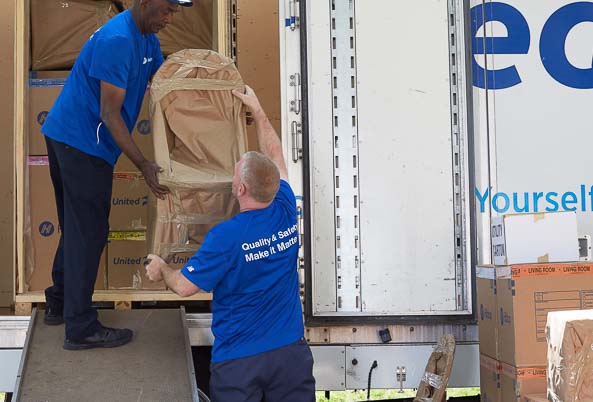What is considered a consumable item?
- There are two types of consumable items: edible and non-edible.
- Edible consumables are food items, edible either as they are (such as packaged cookies, canned tuna) or edible as part of prepared items (such as flour or oil used to bake a cake).
- Non-edible consumables are used for personal maintenance –e.g., toiletries, paper products –or for household maintenance –e.g., cleaning products or paper products. This DOES NOT include items to maintain an automobile or other machinery. Nor does it include charcoal, which is considered a non-allowable, hazardous item.
How long is the standard transit time for an air shipment?
Approximately 18-20 business days on average, but this will vary based on your destination.
How long does U.S. Customs take when an ocean shipment arrives into the United States?
Approximately 5-10 business days, depending on if there are no holds placed on goods (exam/documentation).
Can food/alcohol be sent back to the United States from overseas?
Yes, however, there are costs for importing any food/alcohol which will vary by U.S. port of arrival. A completed Food/Drug Administration form is required in order to import.
Are you able to handle relocating pets?
Unfortunately, not. We can recommend an approved air specialist who can assist with this. AIR ANIMAL, who can be reached at #800-635-3448 for further assistance. Thousands of animals travel happily all over the world, and often it’s quarantine regulations that cause the greatest problems. Every country has its own regulations regarding the importation of pets (and this is especially true of birds, such as parrots) so discuss arrangements well in advance.
What is a lift van?
A lift van is a large strong waterproof wooden shipping case in which household or other goods may be sealed and shipped as a unit overseas.
How do I fill out U.S. Customs forms?
We provide them with a helpful hints form. Please contact your move counselor who can walk you through this process.
What will I have to leave behind?
Take the time to discuss this with your mover, who will have Customs regulations for your destination country. Generally speaking, dispose of all flammable items, liquids, foods and other items that should not be shipped. Think carefully about electrical goods, including refrigerators, cookers and the like. They may not work at your destination and will require a significant amount of labor to transport.
What about my car?
In some countries, the import duty on cars is so crippling you may not want to even think about importing one. Others will have special regulations regarding emission controls or even have rigorous steam cleaning requirements. Please check with your counselor.
What is off limits?
Drugs, alcohol, weapons, ammunition and pornography. Be advised that certain countries will not allow certain newsstand magazines.
Should I pack myself?
You certainly can, but it is not recommended. If you decide to pack yourself, you should be aware of potential problems. For instance, insurance companies will not pay out on goods packed by the owner. Also, Customs officials will almost certainly target goods that you have packed. If you really must pack some of your goods, leave the carton unsealed so that the packing crew can inspect the contents and annotate the inventory accordingly.
How long is this journey going to take?
Probably longer than you think. If you use air freight, allow up to 14 days door-to-door. If you are talking about remote areas, it will take longer. By sea, it depends where you are going, but some reasonable estimate are as follows: Europe/USA – four to six weeks, Asia/USA – six to eight weeks and Australia/USA – six to eight weeks.
And when it arrives, then what?
The destination agent chosen by Hilldrup will contact you as soon as your shipment arrives. The company will clear it through Customs, complete the paperwork and arrange delivery to your new home. You may be expected to be present if your shipment is inspected by Customs. As soon as you arrive at your destination country, contact the appointed agent and make delivery arrangements.
